- Home
- Peter Carey
Amnesia Page 27
Amnesia Read online
Page 27
At other times he had pressed his ear against this door, sometimes his back. Sometimes he had heard laughter, sometimes television. No-one had ever knocked on it before. Who’s there, in the name of Beelzebub? He had, until that very moment, assumed that those on the other side like the woman who had driven him from Newcastle, the boy who delivered him upriver, that whole tribe of river rats and dry drunks who had kept him supplied with food and drink, the crew of surf lifesavers, all these people had a benevolent intention towards him. He knew them to be brave individuals who revered his occupation and would place themselves at risk to ensure the story was told in all its complexity, no matter what pistol-wielding thug might try to stop it.
What? he asked the door.
A white paper napkin slid in over the carpet, its message clearly visible.
KEEP AWAY FROM THE WINDOW.
He retreated to the vicinity of the bed and donned a pair of boxer shorts.
He imagined he could hear newcomers entering the next room of the suite. There were sounds of distress, although they possibly had been produced by a television soundtrack. Someone coughed. He thrust his papers, tapes and batteries under the mattress and remade the bed. Then, with his heart beating loudly in his ears, he slipped beneath the iridescent quilt. He waited. He faced the door with his knees drawn up. He embraced his pillow like the child of divorcing parents. He threw off the blanket and pulled his trousers on. He took three steps to the connecting door which, being of the hollow-core variety such as can be purchased at Mitre 10 for less than $50, was no serious barrier to anything. Perhaps he might have kicked it down.
He knocked.
The voices ceased. TV ditto. The door flew open. He saw several young men and women fleeing like cockroaches from light. He saw a woman with two gold earrings shaped like shells. On her slender wrist there was a bracelet, also gold. She reached to grasp a hand. He was shocked to realise that the hand belonged to Claire Moore, his wife. She wore a long man’s coat and tennis shoes. Her perfect girlish legs were bare, as if straight off the court, and she was flushed.
You’ve lost weight, she said, and held out her ruined potter’s hands.
Celine Baillieux, who did not know her, then placed her hands familiarly on Claire Moore’s shoulders.
Felix Moore felt the force of emotions he had imagined safely locked away.
His wife was searching his face. She asked, How much are you drinking?
I fucked it up.
Idiot, I love you.
The fugitive held up a single finger, then two palms, then retreated to the bathroom where he confronted the embarrassment of his crumpling mask, the snot in his mad beard, the red wine stains on his dirty teeth.
Fubsy, Claire called, let me in.
But he was ugly with snivelling gratitude.
Let me clean my teeth, he said. But he had no toothbrush [sic] and when he finally emerged his eyebrows were mad and his wet hair stood on end.
His wife then informed him that Gaby was Celine’s only daughter. So would Felix please write what Celine wanted him to write.
Claire patted the bed and he sat beside her. He was very pleased to have his hands taken.
You’ve got a lovely wife, Celine said now.
You shouldn’t be here, he told his wife. There are people trying to kill me.
I went with them, Claire said. I’m here to drive some sense into you. They’re on deadline. They’re editing right now.
He registered that his writing was being fucked with. At the same time he beheld that dear familiar face and understood that she would take him back.
I was at Five Dock tennis club, she said. The game was nearly over.
You walked away from a third set?
She honoured him with a private smile.
That was who Claire was. She was being taken to see her estranged husband but she was a good citizen, she would not let down the others. That was who she was. She could not play singles because she had no killer streak, but she was an ace at doubles because she could never let her partner down.
Listen, Celine said, listen to what Claire wants to say.
Claire’s hand was pressing on his knee. Felix, she said, please do what they want.
What do they want?
Are you really making Gaby seem as if she’s guilty?
In the midst of this upset, the fugitive was pleased to feel his wife’s restraining hand.
You will not fiddle with my words, he told Celine.
Listen to your wife.
What is all this “editing”?
We are fixing your awful spelling. We are preparing the digital edition. But it reads like you want my daughter dead, so maybe you could think about that.
Then don’t publish it. Burn it. I don’t care.
Fubsy, Claire said.
The fugitive looked into his wife’s brown eyes and when she had taken stock of him she shook her head and laughed. He can’t be changed, she said and, with the back of her hand, brushed the tangled beard. Dear old fool, she said. Don’t be brave.
He was frightened that he would make an ugly scene by crying. See you soon, he said, and abruptly turned his back. She knew enough to let him be, and he was stupid enough to let her climb back in the truck without once saying that he loved her.
When it was quiet he returned to work as he had left it. That is, he knew his subject had no wish to be innocent. It was her job to be the guilty one. They will say there are no female programmers, she said on tape, and everything is there to make sure your gorgeous boy is on the fast track, making deep algorithms while you are likely to get yourself stuck in some fucking data centre mounting servers, changing tapes, and running cable under the floor. If you drop out of high school your workmates will be idiots trying to feel your tits, managers who want to fuck you and “promote” you to marketing or customer support, on the phone all day explaining technology to morons. I almost did this to myself.
I thought I was being brave but I was being the girlfriend without knowing it. I had so much fun hacking that I spent almost no time programming. I was my own worst dream: a fucking “hobbyist” or a “power user” sitting in the dunny reading old issues of Macworld. But when I got it, she said, I got it: writing software is so intensely pleasurable it should be against the law. I was not employed to do this. You don’t get paid to do it, it pays you. You go to sleep at four in the morning. You are awake at seven, with your brain already working: why is that program running slowly, what is causing this lurking bug. Girls don’t program? Bullshit. When I was a daytime suit I was a good suit because I knew more than the programmers. Even in the years when Frederic was an overpaid public genius, when he grew his hair, long like a Beatle, wore button-down shirts, narrow black ties, and slim tight single-breasted jackets, through those years I was a suit by day, we binged at night together.
Code is simple to understand. It is a language to talk to people and machines. Think of Montaigne writing an essay, shaping ideas, seeking beauty, clarity, simplicity and concision. A good code language lets you do this. When you are on fire then beauty arises. It’s like, for instance, Euclid’s proof that prime numbers are infinite. Or it’s like Brancusi’s Bird in Space, elegant solutions to complex problems. Some coding languages make this impossible and some computer programmers are the walking dead, but if you’re working in an expressive language you spend your nights all over the heavens quote unquote.
From the beginning, Frederic and I were builders, she said. We reconstructed Zork when we were babies. Later, much later, we would make architecture, feature by feature, clamp interfaces together, squash bugs, supercharge the hotspots to make them faster still. We built in air and electricity, in 1’s and 0’s and nothing more.
But when Frederic came back from northern New South Wales, we built a physical structure in the paddock outside Agrikem. This was the premier event. This is all you need to understand.
IT WAS WINTER. There was frost on the grass and Frederic and I were cockatoos, keeping wa
tch on McBryde Street while Mervyn crawled beneath the fence. He was dressed in rubber boots and waterproofs, so this was not an easy thing to do. Plus he had gaffer tape to close the gap between his sleeves and his rubber gloves and he wore a motorcycle helmet with a visor. Not bad for a man of seventy-five. He opened the sewer plate and lowered in a billy can and we watched as he retrieved it and poured its contents into three brown bottles. He took his time, wrapping each one in a plastic bag. Finally we met him at the fence and held up the barbed wire for him to get back out.
We were there because Mervyn was a relentless old codger with a long history in the labour movement. His mate Herby Waltzer was a former secretary of the Australian Manufacturing Workers Union. Herby had a nephew at the Batman Institute of Technology (BIT). The nephew was doing a PhD in environmental science and would be “honoured” to analyse our effluent for free. Even better, he could do this under supervision by the acting head of his department. All we had to do was get a sample.
The BIT tests took a whole month. Herby Waltzer’s nephew had found a furan (2,3,7,8-TDCF) and other toxic polychlorinated dioxins. His supervisor had written: there are no safe levels for dioxins and furans. They should not be entering the sewage system at all. They are dangerous in the sense that they can cause harm to the environment in even very small amounts.
This arrived by snail mail in Darlington Grove and I went to Sydney Road and paid for photocopies.
This was when I would bridge the gap between my father and Mervyn. Maybe Mervyn was a stirrer and a ratbag but corporate crime was right up Sando’s alley. This was the best gift you could give him: a polluter, caught red-handed, and shamed with solid proof, printed out in rows of numbers from the Batman Institute of Technology. I said nothing about Mervyn yet. It was the numbers that were the point and when my father had finished reading he dragged me into his chair and there, with me all bruised and tangled, he kissed my head. We’ve got the bastards, he said. I was not going to screw this up. I said nothing about Mervyn. I cooked him tuna casserole instead. We washed up together and then he took me through the BIT report which he clearly understood.
He said that this student had found 1.4 parts per billion of the furan 2,3,7,8-TCDF. This level was equivalent to 143 parts per trillion of dioxin 2,3,7,8-TCDD. Don’t worry what it means. Just understand that 0.038 parts per trillion in water is enough to start killing fish. Agrikem’s effluent also contained chlorophenols, the precursors for the manufacture of 2,4-D. Several different types of these chemicals were found, including dichlorophenol and trichlorophenol. The samples contained one hundred times Agrikem’s allowed limit of their Trade Waste Agreement.
My dad called the minister on his private line, at night. We were not nervous or intimidated. He said, Goodso, we got the bastards, and then he faxed the report straight to him. This was Sando at his best. It was worth living in a creepy house to see him shine like this.
So the minister would table the report, no wucking furries, but he could not possibly do it until it had been officially signed by BIT. He was not in the business of defaming a manufacturer. BIT said this would be routine, and then the analysis was misplaced, then found, and then there was a letter from their legal counsel stating that the institute would not support “unsupervised work” performed outside the department.
But you can read it out in parliament yourself.
In my dreams.
But you do have that privilege?
Sweetie, no. I can’t.
Yes you can. If you want to you can. (I suppose I was obnoxious.) You have to, I said.
For Christ’s sake, Sando cried. Shut up.
That’s where it turned, in a nanosecond, Gaby said. I told him he should apologise. We were standing in the kitchen. He had a jar of peanut butter in his hand and he threw it at the window. Glass sprayed around the room. There were shards in my hair. I was afraid and angry all at once. He tried to hug me and say that he was sorry. I told him he was a failure to his whole electorate. I asked him how many birth defects had been reported in Fawkner. I just made that up, based on nothing.
He laughed at me. Who ever made you think you could talk to me like that?
Don’t you laugh. Stop it.
But he wouldn’t or couldn’t. He crunched across the glass. I told him he was drunk, although he wasn’t. I said he was abusive. I stuffed clothes in my schoolbag and bicycled around Brunswick and Royal Parade looking for Frederic’s mother’s van.
I HURT my father and so he changed. After that I was always innocent or stupid. If I learned or questioned something, it was because of someone else. If I criticised him, I had been influenced. This way he could keep on loving me no matter what I did.
He discovered the floppy disk “Find Gaby’s Pussy.”
He would have had no clue about how to access it. He just blamed the school for what he feared it was and he visited my home-room teacher. He didn’t like that she was a “girl” with torn jeans and spiked-up hair. Her boyfriend was in Cosmic Psychos or The Hairballs, one of those. Crystal was a punk revival feminist. She dealt with my father and calmed him down. When he left she played the game. Of course she got the joke, that Frederic was my pussycat. Then she went through the code afterwards, learning from us, line by line.
There were teachers who were always stressed by the lack of structure. They thought they were radicals because they walked off the job when an Education Department inspector arrived. But not all of them were suited to real life in a democracy. Crystal was born to be our teacher. She encouraged us to take votes. She smoked with us in the “man hole.” She taught us by learning alongside us. I had become obsessed with the Merri Creek, so that was very cool with her. She had known nothing about the soil, the history, the politics, the birds and trees, so we all started to do the work together.
When my dad chickened out on presenting the dioxin numbers in parliament it was just natural that I took the BIT analysis to Crystal. This was what she was on earth to do. She added Agrikem to my Merri Creek map. She got us studying herbicides, which led us to dioxin, which led us to Agent Orange, to Australia’s part in the Vietnam War which had finished before we were born.
She went to MetWat’s head office in Flinders Lane, down near Spencer Street station, and returned with an annual report. We were righteous and outraged by what we found in it, pictures of the men to whom we had given custody of the most precious commodity on earth, our water. They were “corporate advisors specialising in debt, performance improvement.” They were on the boards of Genteck, BankWest, National Australia Bank and Bank of New Zealand, CSIRO. They were Civil Engineering, M. Engineering, FAIM, FIE (Aust.), B. Science and Engineering. They had backgrounds in the manufacturing industry. They had worked for mining companies and multinational accountants. We were not persuaded they could be trusted with the common good.
Am I ranting? Alone in a room. Talking to the wall. Will anybody ever hear me?
In class Freddo and I wrote a very buggy “Active Agent Puppet” game in BASIC. Dioxin was the active agent and the puppets were the shiny-faced men on the MetWat board. Crystal was a published writer. She helped us to imagine individual characters, pathetic, fretful, boastful, or falsely innocent like the amoral Harold Skimpole in Bleak House (which we had to read). Skimpole said he was innocent as a child. So we put him on the board as well. Not even Frederic could resolve the code issues, but our fire spread throughout the school.
The mad beaky-nosed art teacher projected images of the board members on wet cartridge paper and we painted over them, making bleeding, fuzzy portraits of men with shadow eyes, and vast gold buttons on their creepy suits. The shop guy was Doug the Organic Mechanic. He taught mitre cuts in fifth-year shop. Then his class made real frames so we could have an art show and an opening. Our portraits hung round the edge of the upstairs gallery where mad Methodists had once studied scripture in compartments shaped like segments of a pie.
Are there schools like this today? Probably not. We all thought we were inventin
g the future which we imagined would be better than the past.
We had a class visitor I recognised from Lygon Street: a punkish older guy with thin red hair and rings and screws and safety pins like medals on his face. He used to set up a folding table some Saturdays. He displayed awful pictures of deformities and bubbling flesh. He had red sunglasses. I had always thought he must be nuts.
In our home room, Eddy Margolis asked him what band he was in. He said shut up, don’t be a smart-arse. He had been a sergeant in the Australian army handling herbicides. They had made him ill.
I smiled at him in sympathy. He stared right through me.
After his gruesome talk he said he was not there to encourage us to break the law but he himself was going to pay a personal visit to the sewer on the map we had made. He had not known about it previously, but he would confirm or deny the analysis on the spot. Me and Undertoad went on our bikes. When we arrived we could see Crystal’s beat-up van and some figures in the smudgy gloom beyond the barbed-wire fence. It was damp and cold on McBryde Street and the wind was blowing from the east and we squeezed under the bottom strand and found our teacher and our class all huddled at the stink hole. Our expert was still wearing his red-coloured dark glasses. He lifted the plate without any iron bar, just with thumb and forefingers. He did not even set it on the ground.
OK, he said. What do you smell?
Chemicals.
Like what?
Like manure, like cow shit.
Yes. Nitrogen-rich. What else?
Like plastic?
Like plastic yes. Does anyone know what silicone caulking smells like?
No-one did.
It smells like manure and plastic and silicone caulking. There is no smell like it. Whose eyes are running?
Everyone’s.
So, said Crystal, what would you say if MetWat swore there was no dioxin?
Stay away from here.
What can we do?
Nothing. Stay away.
We crossed the sodden overgrazed grass and slipped through the chained front gate. It was all so ordinary. The streets, the little houses, the bad smell, a plumber’s van reversing from a driveway. Crystal gave me a sort of hug and said, Promise you will stay away now. She did not know me very well. I hardly knew myself.

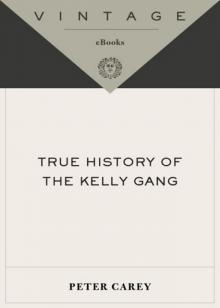 True History of the Kelly Gang
True History of the Kelly Gang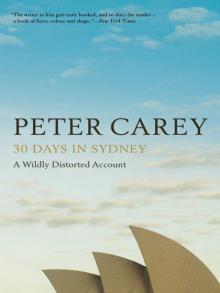 30 Days in Sydney: A Wildly Distorted Account
30 Days in Sydney: A Wildly Distorted Account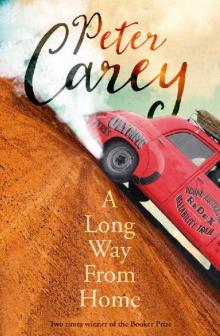 A Long Way From Home
A Long Way From Home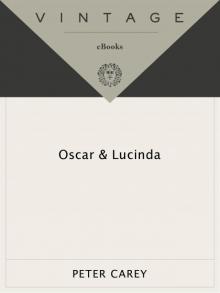 Oscar and Lucinda
Oscar and Lucinda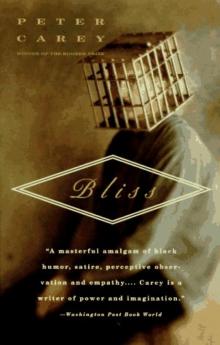 Bliss
Bliss Wrong About Japan
Wrong About Japan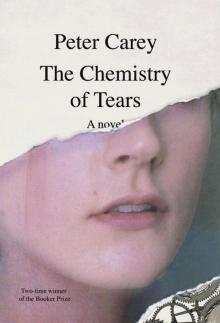 The Chemistry of Tears
The Chemistry of Tears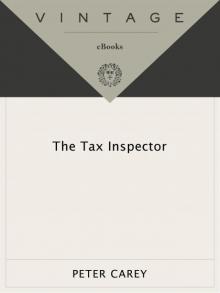 The Tax Inspector
The Tax Inspector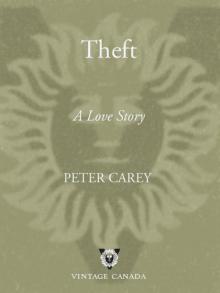 Theft: A Love Story
Theft: A Love Story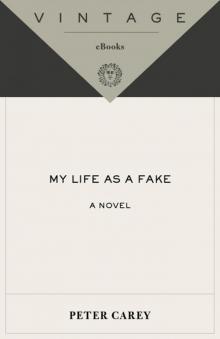 My Life as a Fake
My Life as a Fake Collected Stories
Collected Stories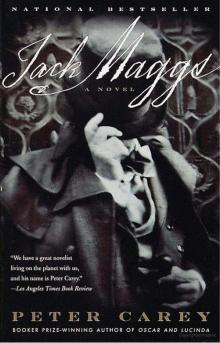 Jack Maggs
Jack Maggs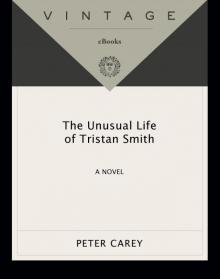 The Unusual Life of Tristan Smith
The Unusual Life of Tristan Smith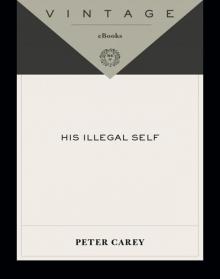 His Illegal Self His Illegal Self His Illegal Self
His Illegal Self His Illegal Self His Illegal Self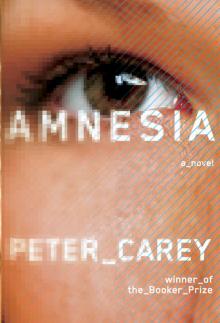 Amnesia: A Novel
Amnesia: A Novel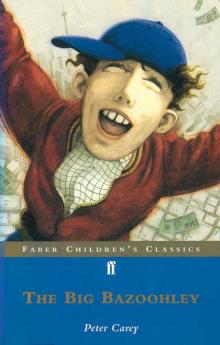 The Big Bazoohley
The Big Bazoohley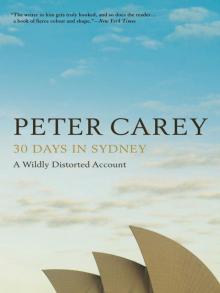 30 Days in Sydney
30 Days in Sydney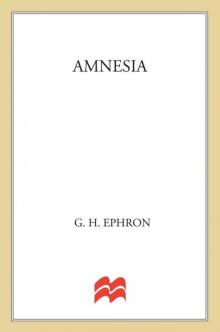 Amnesia
Amnesia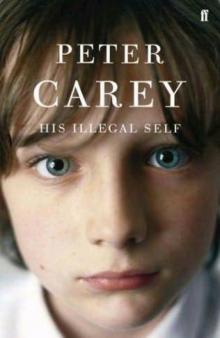 His Illegal Self
His Illegal Self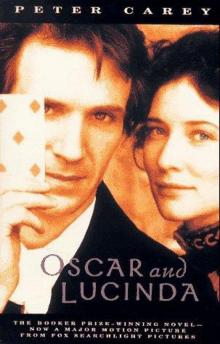 Oscar and Lucinda bw-1988
Oscar and Lucinda bw-1988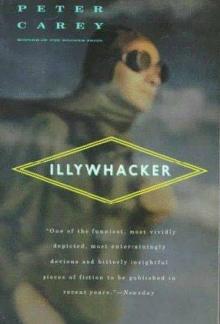 Illywhacker
Illywhacker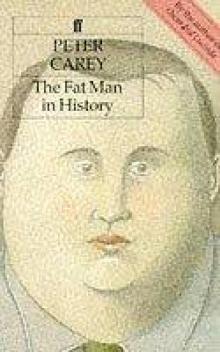 The Fat Man in History aka Exotic Pleasures
The Fat Man in History aka Exotic Pleasures